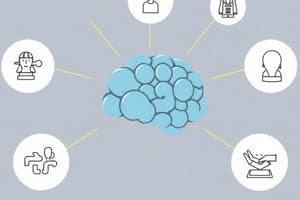Podcast
Questions and Answers
What is self-efficacy?
What is self-efficacy?
People's beliefs in their capabilities to produce desired effects by their own actions.
The word 'movere' in Latin means to move.
The word 'movere' in Latin means to move.
True (A)
List two key components of Hull's drive-reduction Theory.
List two key components of Hull's drive-reduction Theory.
Physiological need and aroused tension state.
Which of the following is NOT a primary drive?
Which of the following is NOT a primary drive?
Who developed the concept of learned helplessness?
Who developed the concept of learned helplessness?
Drive reduction theory focuses on behavior arising from _____ needs.
Drive reduction theory focuses on behavior arising from _____ needs.
Match the following theories with their descriptions:
Match the following theories with their descriptions:
Which of the following reflects intrinsic motivation?
Which of the following reflects intrinsic motivation?
Flashcards are hidden until you start studying
Study Notes
Motivation: The Essence of Action
- Motivation is the driving force behind goal-directed activities, energizing, directing, and sustaining our efforts. It stems from the Latin word "movere," meaning "to move."
Instinct Theory
- Sigmund Freud proposed that human behavior is driven by life and death instincts.
- Konrad Lorenz observed the imprinting behavior of animals, suggesting a biological basis for certain behaviors.
- Herding behavior in animals is another example of instinctive tendencies.
Drive-Reduction Theory
- This theory posits that physiological needs give rise to drives that motivate us to satisfy those needs, achieving a state of homeostasis.
- Hull's Drive Reduction Theory highlights the role of drives in motivating behavior.
- Primary drives are innate and essential for survival, such as thirst, hunger, and sex drive.
- Secondary drives are learned and often satisfy primary drives indirectly, such as the desire for wealth.
Incentive Theory
- People are motivated by rewards and avoid negative consequences, leading to what is known as incentive theory.
- Intrinsic motivation arises from personal satisfaction, while extrinsic motivation stems from external rewards or punishments.
Learning Theory
- Operant (trial & error) conditioning, pioneered by Skinner and Thorndike, emphasizes learning through repeated trials and rewards.
- Reinforcement strengthens a behavior through the addition or removal of a stimulus.
- Punishment weakens a behavior through the addition or removal of a stimulus.
- Learned helplessness, described by Martin Seligman, occurs when an organism experiences repeated failures despite efforts and eventually gives up, leading to depression.
The Forced Swim Test
- This test is used to assess depression-like behavior in animals, where they are placed in a water tank from which they cannot escape.
Studying That Suits You
Use AI to generate personalized quizzes and flashcards to suit your learning preferences.




